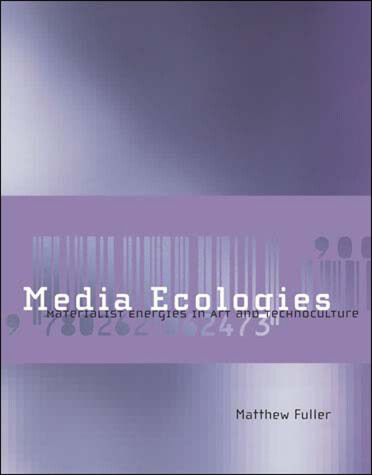Leonardo
2 total works
A cultural field guide to software: artists, computer scientists, designers, cultural theorists, programmers, and others define a new field of study and practice.
This collection of short expository, critical, and speculative texts offers a field guide to the cultural, political, social, and aesthetic impact of software. Computing and digital media are essential to the way we work and live, and much has been said about their influence. But the very material of software has often been left invisible. In Software Studies, computer scientists, artists, designers, cultural theorists, programmers, and others from a range of disciplines each take on a key topic in the understanding of software and the work that surrounds it. These include algorithms; logical structures; ways of thinking and doing that leak out of the domain of logic and into everyday life; the value and aesthetic judgments built into computing; programming's own subcultures; and the tightly formulated building blocks that work to make, name, multiply, control, and interweave reality. The growing importance of software requires a new kind of cultural theory that can understand the politics of pixels or the poetry of a loop and engage in the microanalysis of everyday digital objects. The contributors to Software Studies are both literate in computing (and involved in some way in the production of software) and active in making and theorizing culture. Software Studies offers not only studies of software but proposes an agenda for a discipline that sees software as an object of study from new perspectives.
Contributors
Alison Adam, Wilfried Hou Je Bek, Morten Breinbjerg, Ted Byfield, Wendy Hui Kyong Chun, Geoff Cox, Florian Cramer, Cecile Crutzen, Marco Deseriis, Ron Eglash, Matthew Fuller, Andrew Goffey, Steve Goodman, Olga Goriunova, Graham Harwood, Friedrich Kittler, Erna Kotkamp, Joasia Krysa, Adrian Mackenzie, Lev Manovich, Michael Mateas, Nick Montfort, Michael Murtaugh, Jussi Parikka, Soren Pold, Derek Robinson, Warren Sack, Grzesiek Sedek, Alexei Shulgin, Matti Tedre, Adrian Ward, Richard Wright, Simon Yuill
In Media Ecologies, Matthew Fuller asks what happens when media systems interact. Complex objects such as media systems—understood here as processes, or elements in a composition as much as "things"—have become informational as much as physical, but without losing any of their fundamental materiality. Fuller looks at this multiplicitous materiality—how it can be sensed, made use of, and how it makes other possibilities tangible. He investigates the ways the different qualities in media systems can be said to mix and interrelate, and, as he writes, "to produce patterns, dangers, and potentials."
Fuller draws on texts by Felix Guattari and Gilles Deleuze as well as writings by Friedrich Nietzsche, Marshall McLuhan, Donna Haraway, Friedrich Kittler, and others, to define and extend the idea of "media ecology." Arguing that the only way to find out about what happens when media systems interact is to carry out such interactions, Fuller traces a series of media ecologies—"taking every path in a labyrinth simultaneously," as he describes one chapter. He looks at contemporary London-based pirate radio and its interweaving of high- and low-tech media systems; the "medial will to power" illustrated by "the camera that ate itself"; how, as seen in a range of compelling interpretations of new media works, the capacities and behaviors of media objects are affected when they are in "abnormal" relationships with other objects; and each step in a sequence of Web pages, Cctv—world wide watch, that encourages viewers to report crimes seen via webcams.
Contributing to debates around standardization, cultural evolution, cybernetic culture, and surveillance, and inventing a politically challenging aesthetic that links them, Media Ecologies, with its various narrative speeds, scales, frames of references, and voices, does not offer the academically traditional unifying framework; rather, Fuller says, it proposes to capture "an explosion of activity and ideas to which it hopes to add an echo."

